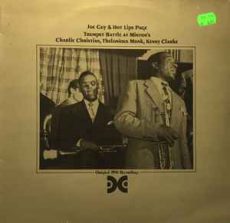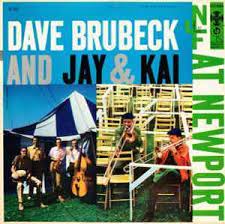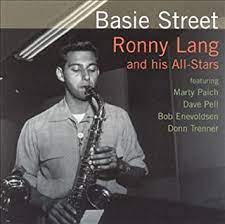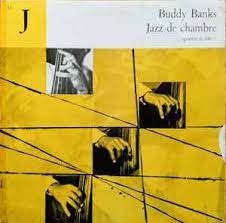
Daily Dose Of Jazz…
Joseph Luke Guy was born in Birmingham, Alabama on September 20, 1920 but much of his early personal life is obscured. He began his professional music career performing in New York City, and joined Fats Waller’s backup band in the late 1930s. Following that, in 1938, he succeeded Dizzy Gillespie in Teddy Hill’s orchestra.
Patterning his playing style after his musical role model, Roy Eldridge, despite his range, speed, and potential, Joe never managed to surpass Eldridge’s abilities, though he was considered a musical talent when taking into account his young age.
In 1940 he became a key soloist in Coleman Hawkins’ short-lived big band. 1941–42 saw Guy as a regular performer as a member of the after-hours band at Minton’s Playhouse alongside Nick Fenton, Kenny Clarke, and Thelonious Monk in jam sessions with early bop music. During this period he was actively involved in numerous recordings by Jerry Newman, and also appeared on songs by Charlie Christian, Hot Lips Page, Roy Eldridge, and Don Byas.
Incorporating Gillespie’s influences into his playing, Joe’s performance on Monk’s 1942 song Epistrophy is arguably the highlight of his recording career. Much of his appearances as an instrumentalist are marked by his enthusiasm and tempo, however, on occasions would over exert himself and consequently sound erratic.
Struggling with a heroin addiction throughout the majority of his brief career, in 1945–46 Guy was involved with Billie Holiday both professionally and intimately. When they were both busted for drug possession, the two cut ties thereafter. Afterwards, sidelined him from further success, he moved back to his hometown and fell into relative obscurity among the music industry.
Trumpeter Joe Guy, who performed locally in his hometown and advised others about the dangers of his addiction, transitioned on June 1, 1962, at the age of 41.
More Posts: history,instrumental,jazz,music,trumpet

Daily Dose Of Jazz…
Norman Louis Bates was born on August 26, 1927 in Boise, Idaho. His mother was an organist and he was a younger brother of bassist Bob Bates. He played in Jimmy Dorsey’s band for a year in 1945, then with Raymond Scott and Carmen Cavallaro shortly thereafter.
By 1948 he was part of the Dave Brubeck Trio, and the following year performed with Paul Desmond. Norman recorded with Jack Sheedy’s Dixieland Jazz Band in 1950.
After spending four years in the Air Force, Bates played with Wally Rose’s Dixieland Band in 1955 and then replaced his brother Bob in Brubeck’s quartet, playing on multiple albums from Dave Brubeck and Jay & Kai at Newport (1956) onwards. He also recorded with Desmond’s group again in 1956. In 1957 he left Brubeck, and led a trio in San Francisco, California.
Double bassist Norman Bates transitioned on January 29, 2004.
Bestow upon an inquiring mind a dose of a Boise bassist to motivate the perusal of the genius of jazz musicians worldwide whose gifts contribute to the canon…
More Posts: bass,history,instrumental,jazz,music

Daily Dose Of Jazz…
Adam Shulman was born on August 1, 1979 in San Francisco, California. Taking what he learned studying piano during his formative years, he headed to Santa Cruz he matriculated through the University of California with a degree in classical performance. While at UCSC he studied jazz piano with Smith Dobson.
Returning home he became a staple on the city’s jazz scene, leaning towards and playing in the bop genre. Adam has been seen working with countless bay area musicians and vocalists such as Marcus Shelby, Anton Schwartz, Ed Reed and Kellye Gray among many others. Beyond the locals he has played and/or recorded with Stefon Harrism Willie Jones III, Dayna Stephens, Mark Murphy, Alan Harris, Luciana Souza, Sean Jones, Grant Stewart and John Clayton to name a few.
A consummate sideman, Adam is a composer and arranger. He has done much of the arranging for the jazz and cabaret singer Paula West and has released four albums of original music as a leader and continues to perform, arrange and compose.
More Posts: arranger,bandleader,composer,history,instrumental,jazz,music,piano

Daily Dose Of Jazz…
Ronnie Lang was born July 24, 1929 in Chicago, Illinois. Sometimes spelled Ronny, his professional début was with Hoagy Carmichael’s Teenagers. He went on to play for a year with Earle Spencer in 1946, then with Ike Carpenter, and Skinnay Ennis the following year.
Gained attention during his two tenures with Les Brown’s Orchestra between 1949–50 and 1953 to 1956, he recorded with the Dave Pell Octet in the mid-1950s. During this time he moved to California and attended Los Angeles State College of Applied Arts and Sciences studying music and woodwinds.
By 1958 he had become a prolific and busy studio musician in Los Angeles, often employed by Henry Mancini. Ronnie played the iconic sax melodic line in Bernard Herrmann’s score for the 1976 movie Taxi Driver. He also recorded with Pete Rugolo, Bob Thiele, and Peggy Lee.
Alto saxophonist Ronnie Lang, who also played flute and clarinet in the bop, progressive, big band, swing idioms, is now retired at 92.
More Posts: bandleader,clarinet,flute,history,instrumental,jazz,music,saxophone

The Quarantined Jazz Voyager
This week the Jazz Voyager is choosing from the library of rare gems seldom heard on this side of the pond. Thanks to the internet, as you listen to the twenty-nine minutes of the album, remember to keep vigilant about the safety of your health and others. On the turntable is the hard bop Jazz De Chambre, a 1954 recording by double bassist Buddy Banks.
Buddy Banks, originally a saxophonist who switched to bass, had arrived in Europe after World War II. On this session he is accompanied by drummer Roy Haynes, pianist Bob Dorough, and guitarist Jimmy Gourley. The leader takes the spotlight in a subtle take of Yesterdays, though a strange clicking mars an otherwise swinging “I Love You.” Banks’ group also offers serviceable interpretations of modern pieces like Gerry Mulligan’s Line for Lyons and Milt Jackson’s Bag’s Groove.
The album was recorded at Geneix Studio in Paris, France and was produced by Frank Ténot. The liner notes were provided by Alain Tercinet with English translation by Martin Davies.
Tracks | 32:56- A Night In Tunisia (Dizzy Gillespie / Frank Paparelli) ~ 4:26
- Almost Like Being In Love (lan Jay Lerner / Frederick Loewe) ~ 3:19
- Bag’s Groove (Milt Jackson) ~ 3:47
- Yesterdays (Otto Harbach / Jerome Kern) ~ 3:29
- I Love You (Cole Porter) ~ 5:58
- Line For Lyons (Gerry Mulligan) ~ 3:46
- You Go To My Head (J. Fred Coots / Haven Gillespie) ~ 4:29
- Buddy Banks Blues (Buddy Banks) ~ 3:27
- Bob Dorough ~ piano
- Buddy Banks ~ double bass
- Jimmy Gourley ~ guitar
- Roy Haynes ~ drums
More Posts: adventure,album,club,double bass,genius,jazz,museum,music,preserving,restaurant,travel




